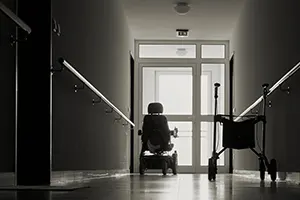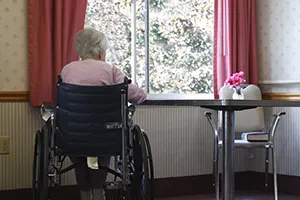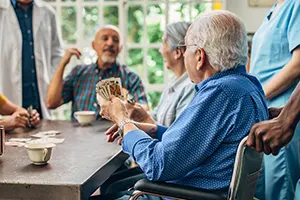

West Palm Beach Nursing Home Abuse Lawyer
 It’s a horrible fact that numerous elderly persons and disabled adults experience some form of nursing home abuse. Florida alone has had many cases of nursing home neglect or abuse that led to injuries and deaths. Our nursing home abuse attorney in West Palm Beach noted that official numbers do not even include numerous unreported cases where the adults do not realize they are being abused or are unwilling to document it.
It’s a horrible fact that numerous elderly persons and disabled adults experience some form of nursing home abuse. Florida alone has had many cases of nursing home neglect or abuse that led to injuries and deaths. Our nursing home abuse attorney in West Palm Beach noted that official numbers do not even include numerous unreported cases where the adults do not realize they are being abused or are unwilling to document it.
If you believe that your loved one is being mistreated, neglected, or abused in a Florida nursing home, contact Philip DeBerard, Injury Attorney. The DeBerard office is a highly reputed firm serving The Treasure Coast &, and we’re well-equipped to protect the rights of your loved one, as well as yours. We ensure the resident is safe as we find the optimum strategies to hold the at-fault party accountable and get financial compensation for your family.
Is There a Deadline for Filing a Nursing Home Abuse Lawsuit in West Palm Beach?
Under Florida’s Statute of Limitations, you have only two years to sue for nursing home abuse, starting from the date of the last known abuse incident. Though two years seems like ample time to bring a lawsuit, it’s vital to take action as soon as possible by getting an attorney’s help to preserve evidence.
Nursing Home Abuse Signs: How to Tell If Your Loved One is a Victim
 Could your beloved elder be abused while residing at a facility? Look out for the following red flags that commonly indicate the resident has experienced neglect or abuse (We discuss more on various types of abuse further below):
Could your beloved elder be abused while residing at a facility? Look out for the following red flags that commonly indicate the resident has experienced neglect or abuse (We discuss more on various types of abuse further below):
- Odd bruises, abrasions, marks on skin, burns, or broken bones
- Several falling incidents
- Bed sores or preventable infections
- Substandard hygiene
- Weight loss
- Withdrawn personality
- Agitation
- Sudden unexplainable changes in financial accounts.
When you notice these signs of nursing home abuse, you should contact an attorney as soon as you can. Here at the Philip DeBerard firm, we first ascertain whether your loved one needs immediate interventions, and if they do, we’ll help ensure they get what they need. We’ll also counsel you on your options under the law to demand accountability from the staff or management, and to claim the compensation you deserve for your losses. Get in touch with us today for your free consultation.
Where to Report Nursing Home Abuse in West Palm Beach
 If the victim needs urgent medical care or police intervention, don’t hesitate to call 911.
If the victim needs urgent medical care or police intervention, don’t hesitate to call 911.
In Florida, we have the Agency for Health Care Administration (AHCA) to regulate, inspect, and license nursing homes, assisted living facilities (ALFs), and other long-term care facilities. If you would like to file a complaint about a West Palm Beach facility, you may do so with AHCA by calling 1-888-419-3456 or 800-955-8771, or by filling out their online complaint form.
Florida also has a state-run volunteer service called the Long-Term Care Ombudsman Program, which investigates and resolves complaints about nursing homes. You may reach them at 1-850-414-2323.
While it’s useful to raise your concern to these offices, they are not the legal channel to get compensation for your medical fees, therapy expenses, pain and suffering, and other losses. To demand compensation, you’ll need to file a civil case against the wrongful party. Let DeBerard help you with this procedure. Our experienced nursing home abuse attorneys in West Palm Beach can be your ally to help you recover what you deserve.
Various Kinds of Elder Abuse in a Nursing Home
 There are physical, emotional, sexual, and financial types of abuse. It can also take the form of neglect. Here’s how these kinds of abuse typically occur at nursing homes, and what red flags to look out for.
There are physical, emotional, sexual, and financial types of abuse. It can also take the form of neglect. Here’s how these kinds of abuse typically occur at nursing homes, and what red flags to look out for.
Nursing Home Physical Abuse
This can occur by striking, slapping, punching, or kicking a resident. Restraints that are injurious may also fall under this category. Be aware of signs such as:
- Unexplainable bruises, scars, welts, or cuts
- Fractures or sprains
- Bedsores
- Injuries or illnesses that the staff can’t properly explain.
Nursing Home Emotional Abuse
Emotional trauma can occur when a facility personnel shouts at, swears at, humiliates, or intimidates a resident. Some substandard facilities may also put residents in isolation or confinement to punish certain behaviors. Signs of emotional abuse can be harder to spot. Be sensitive to your loved one’s:
- Sudden changes in behavior
- Diminished interest in usual hobbies
- Agitation or anxiety
- Withdrawn personality
- Gloomy moods.
Nursing Home Sexual Abuse
We may think of this as rape or sexual assault, but it also includes non-consensual touching of intimate body parts, showing of sexual media, and forced nudity. Symptoms of sexual abuse can include physical and emotional clues such as:
- Unexplained bruises or scratch marks
- Genital sores
- Unexplainable sexually transmitted diseases
- Wincing when being touched
- Becoming withdrawn.
Nursing Home Financial Abuse
When a trusted personnel, nurse, or aide exploits a nursing home resident’s finances, it may be considered abuse. This often entails coercion or manipulation of the resident. The following are indications of financial abuse:
- Unexplainable withdrawals from the resident’s bank account
- Missing cash or possessions
- Sudden transfer of assets from the resident
- Unpaid bills
- Sudden changes in the resident’s will or estate plan.
Nursing Home Neglect
This is the inadequate or improper care of the facility’s residents. Examples are insufficient mobility assistance for impaired residents, not providing medication as required, insufficient cleaning or sanitation, failing to address falling accidents, and not calling a doctor when needed. If your loved one is being neglected, they may manifest symptoms like:
- Bedsores (residents with mobility issues can develop these skin lesions if staff fails to reposition them regularly)
- Untreated infections
- Multiple falls that are unaddressed (nursing homes and ALFs must update a resident’s care plan once they suffer a fall, in order to avoid subsequent falls)
- Weight loss, dehydration, or malnutrition
- Bad hygiene or unsanitary living quarters
- Elopement (resident exits the place without supervision).
Certain People Face Higher Risk of Nursing Home Abuse
 Unfortunately, certain groups of adults could be more susceptible to abuse precisely because they’re in a vulnerable state. One study revealed that older adults with dementia, Alzheimer’s, or other cognitive impairment are at the greatest risk – their abuse rate is about five times that of older adults without dementia. The same study also showed that individuals older than 80 have a higher risk for abuse than younger individuals.
Unfortunately, certain groups of adults could be more susceptible to abuse precisely because they’re in a vulnerable state. One study revealed that older adults with dementia, Alzheimer’s, or other cognitive impairment are at the greatest risk – their abuse rate is about five times that of older adults without dementia. The same study also showed that individuals older than 80 have a higher risk for abuse than younger individuals.
Additionally, there is plenty of research highlighting the increase in abuse risk for socially isolated persons. Without the constant companionship of family around them, residents in nursing homes find very little support network which can ideally help recognize when abuse happens. And when family does visit, abuse victims often feel too embarrassed, ashamed, or intimidated to open up about their experiences.
It’s crucial for family members to be sensitive to the indications of elder abuse. Even if you are unsure about what’s happening, it’s smart to consult a reliable attorney to help you determine your best next steps.
Parties That May Be Liable in a Case of Nursing Home Abuse
 Various parties could be responsible for the abuse occurring at a nursing home. In many cases, more than one parties are deemed liable to pay for the injury or death they caused. Here are persons or organizations that may be culpable in elder abuse cases:
Various parties could be responsible for the abuse occurring at a nursing home. In many cases, more than one parties are deemed liable to pay for the injury or death they caused. Here are persons or organizations that may be culpable in elder abuse cases:
- Nursing home staff or personnel
- Nurse’s aides
- The owner of the nursing home company
- The administrator of the facility
- The licensee of the specific branch
- Nursing home contractor or supplier
- Doctors or therapists.
When you’re claiming against well-resourced defendants, it can be extremely difficult to fight for your rights. You can expect to face major insurance companies and even a team of attorneys shielding the responsible party. Get the help of a dependable nursing home abuse lawyer in Palm Beach County with proven experience handling such claims. In South Florida, Philip DeBerard, Injury Attorney is among the most trusted firms, and we are eager to help you.
Get in Touch with Philip DeBerard, Nursing Home Abuse Attorney in Palm Beach County
Voted the Treasure Coast’s Best Personal Injury Lawyer by TCPalm, Philip DeBerard, Injury Attorney has consistently proven to be an effective advocate for South Floridians. The DeBerard team has been supporting the people of West Palm Beach for nearly four decades, obtaining millions of dollars for families and individuals who suffered due to the fault of others. Tell us about your potential claim of adult abuse. Schedule a free consultation by calling 1-800-299-8878 today.
777 South Flagler Drive, #800, West Palm Beach, FL
Injured?
Request A Free Case Evaluation




